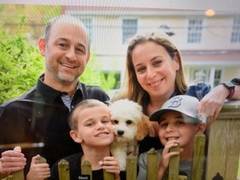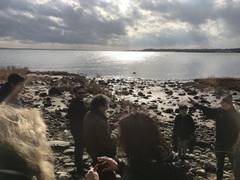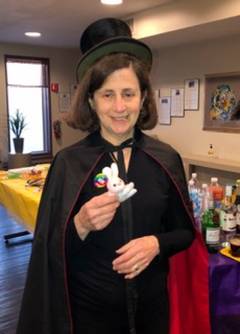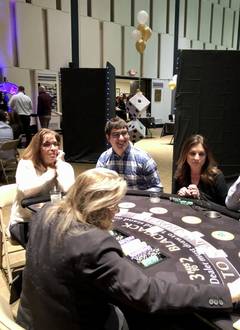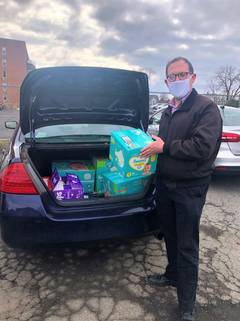Yom Kippur / Yizkor 2023: Love is Like a braid
09/26/2023 11:08:29 AM
Rabbi Ben Goldberg
| Author | |
| Date Added | |
| Automatically create summary | |
| Summary |
To everyone’s surprise, including his own, the musician Paul Simon put out a new album this past spring. He thought he was done writing music, but one night, he awoke from a dream with the unshakable message from, well, somewhere, that he was to work on a project called Seven Psalms. He continued in this manner, rising in the middle of the night to jot down words that came to him, until he had written seven psalms.
The all-acoustic album is gorgeous and poignant, and draws on religious and mystical language. One recurring chorus goes: “The Lord is my engineer / The Lord is the earth I ride on / The Lord is the face in the atmosphere / The path I slip and I slide on.”
One of the psalms is called Love is like a Braid and begins like this:
Love is like a braid, some say
And I, I don't disbelieve it
Cowry shells, fine combs made of jade
To ornament and weave it
I lived a life of pleasant sorrows
Until the real deal came
Broke me like a twig in a winter gale
Call me by my name
And in that time of prayer and waiting
Where doubt and reason dwell
A jury sat deliberating
All is lost or all is well
Many of us have experienced that kind of real deal, something that divides your life into a before and an after, that calls your name and breaks you like a twig: job loss, serious health challenges, the loss of a loved one. The kind of thing that makes every problem you had before feel like a “pleasant sorrow” in hindsight. And then, you hang in the balance between all being lost or well, between life and death, conviction or acquittal. Indeed, Yom Kippur invites us to imagine that today is such a moment, if only as a spiritual exercise, in order to achieve some of the clarifying power of a near-death experience.
It was my honor this past year to accompany someone, in a very small but significant way, through such a “real deal,” which I would like to share with you.
I’ve realized that, if you want such a thing and are lucky, you find a partner, a loving companion and a fitting helper, with whom to spend your life. I count myself as such a lucky person. And, if you want such a thing and are really, really lucky, that person’s family comes to feel like your family, and you join in to a whole group of people you otherwise would never meet. I also count myself as really, really lucky.
One of the reasons I feel that way is Daniel’s Uncle Bob. Bob also married into Daniel’s mother’s family, a generation before I did. It is hard to express just what a special person Bob was, although many people have tried. I remember the first time I met him. It was a bit after I had met the rest of the family because Bob and his wife Zelda lived in St. Louis and the others were all on the East Coast. Bob was funny and witty and curious and charming. I remember saying to Daniel after that meeting just how special it felt to be joining this family.
As time went on, I came to appreciate even more things about Bob. He was just always so fun to be around and any occasion was enlivened by his presence. Daniel’s mother’s family has a tradition of a New Year’s Eve Broadway singalong, and Bob was a constant presence there, playing the piano as everyone sang along to Oklahoma or Hello, Dolly. He loved nothing more than a tasty meal shared with family or friends.
In 2022, Bob’s health declined as cancer attacked his body. I kept up to date on his condition, but admittedly did not think much about it. Bob was only in his early 70s, and his father had just died not long before, at a ripe old age. I received an email, along with many of Bob’s friends and family, in November, where he explained that he had decided for a “do not resuscitate” order in the event of a serious heart or breathing event, given his weakened condition and poor prognosis in that scenario. But even then, death did not strike me as particularly likely.
Fast forward to early January. Daniel was away at a conference, and I was home alone on Saturday night and a bit bored. So, I decided to call up my mother-in-law, as one does. Unbeknownst to me, she was in St. Louis, at the hospital, with her sister and Bob. At that time, the plan was for him to be discharged the next morning so he could receive a certain drug that was only available for outpatients and that was the last hope for prolonging his life.
Upon learning of this situation, I kept the call brief and apologized for interrupting. Immediately when I hung up, I said to myself: Shoot (well, actually, I used a stronger word): Bob is going to die. Perhaps I hadn’t fully grasped the severity of the situation, perhaps it had gotten worse, but suddenly, his impending demise became clear to me. So, I called back. I wanted to tell Bob how much I enjoyed knowing him, what a wonderful uncle he was to Daniel and to me, and to thank him for being so welcoming to me when I enjoyed the family. We spoke for less than a minute, but I could tell, even over the phone, what comfort it brought Bob to hear how much I appreciated and loved him. It was a tremendous privilege to be able to say goodbye to Bob, pretty much by accident, especially knowing there so many others who would have liked to do so and weren’t able.
Bob died a few days later. He never made it to that outpatient clinic, and instead entered hospice care. I later found out that the conversation I had interrupted had been one of those rare ones where Bob had shared how he had made his peace with his death. While he wanted to hang on for just a few more days for his daughter and granddaughters to make it St. Louis (which sadly he missed by mere hours), and to give the promising treatment one more chance to work, Bob also did not want to prolong the inevitable. In that conversation, Bob expressed his regret that his life would not be longer, but also that he felt no regrets about how he used the time that he did have.
What was so remarkable to me about Bob’s dying process was how unflinchingly he looked at his own situation. Already in the November email about his DNR order, he wrote to his family and friends: “I hope it is obvious that I have loved the life I lived, the family I was born with and the one I found, and all my many friends and colleagues. And, if worse comes to worse, I hope you all allow me to continue to live on earth by thinking about me from time to time.”
Bob’s ability to be honest with himself and with his loved ones about his condition was a great gift. Rather than using his final days pursuing medical treatments that would not change the outcome, he spent them surrounded by his wife and other loved ones beside him, listening to the messages of love pouring in by email from friends and family. Bob’s fearlessness enabled so many people to express their love for Bob while he was still able to hear it. It made a tragic situation easier to bear, both for him and for us.
It’s not easy to face our own deaths, especially in American culture, where we generally insist on stories having a happy ending. As Rabbi Sharon Brous recently observed: “we engage in a kind of collective magical thinking: if we don’t talk about [death], maybe it won’t be real. Rather than confront the precariousness and preciousness of life, we avoid and we evade. But death is a part of life. It is normal. It happens to every single being.”
It’s never been easy to admit that we or someone we love is dying. Consider the death of the great ancient Rabbi Yehudah haNasi, as recounted in the Talmud. After years of illness, Rabbi Yehudah is on his deathbed. But his colleagues and students are not quite ready to let the great master go. So they resort to all of the spiritual tools at their disposal. They decree a fast. They conduct a round-the-clock prayer vigil. And, they forbid anyone from saying that their teacher was dying, on penalty of stabbing, lest saying it make it so.
Rabbi Yehudah’s nurse ascends to his attic bedroom and astutely perceives what is happening: that the spiritual titans of the lower realm are contending with the heavenly powers over the soul of the great rabbi, in a kind of tug of war between life and death. She too prays for the rabbi’s students to prevail in their battle against death. She too is not yet ready to let go.
But then, she actually bothers to pay attention to the human being around whom this great fuss is made. He is in incredible agony, his illness necessitating frequent and painful trips to the bathroom. She evidently realizes that what this situation calls for isn’t a prolonged life, but a comfortable and compassionate death, precisely the thing the rabbi’s students are delaying with their prayers. They have selfishly prioritized putting off their own grief over their teacher’s actual well-being, right now.
The nurse now prays: may heaven take him. But the prayers of the students continue to have their effect. So, the nurse takes matters into her own hands. Again she ascends to the roof, with a ceramic jug in her hands, and thrusts it to the ground. The noise of the shattering jug momentarily interrupts the students’ prayers. And in that instant, the heavenly powers, now unopposed, prevail, and escort Rabbi Yehuda’s soul to the next world.
When someone we love is dying, we often need the equivalent of that shattering jug, something that interrupts our thoughts and helps us truly understand what is happening here. I had that in my accidental deathbed phone call to Uncle Bob, and it drew my attention to the intensity and the meaning of that moment, for which I will be forever grateful.
I remember learning in my summer as a hospital chaplain that even doctors can be hesitant to honestly talk about death. I learned from my supervisor that one of the greatest gifts a chaplain could give a patient or their family is to introduce the D-Word into a conversation where everyone is tip-toeing around it, the doctors hiding behind medical terminology and the patient or family hiding behind their denial. My supervisor told me that he would often ask, in view of the patient or family who had just received a long medical explanation: “Wait, doctor. Does all this mean that so-and-so is going to die?” My supervisor knew perfectly well the answer to that question, but would ask it anyway to help facilitate a more honest conversation among all parties. It was his equivalent of the shattered jug.
Yom Kippur can also be that shattered jug for us. It is a day that draws our attention to our own mortality, as we stand in the breach between life and death, if only for a day. And then, like Rabbi Yehuda’s students, we turn to all of the spiritual tools at our disposal. Like them, we fast, we hold a seemingly-endless prayer vigil, we watch our speech so as to avert the severity of the decree. Yet today, for us, the jug shatters, but the earthly realm wins the tug of war. The deliberating jury decides that all is well. We leave Yom Kippur with some unknown amount of more time, written in the mysterious Book of Life, and the resolution to use it well.
And so, smack in the middle of Yom Kippur, as we confront our own mortality, we set aside time to recall our own dear ones for whom the heavenly realms prevailed. In so doing, we remind ourselves that, as Paul Simon sings, love is like a braid: interwoven, enduring, beautiful. Perhaps this braid is the tzror hahayim, the great bond of life that connects the living and the dead. We interweave these strands tighter as we turn to Yizkor, page 569.
Thu, October 16 2025
24 Tishrei 5786
Photo Gallery
Photo Albums
Upcoming Events
-
Thursday ,
OctOctober 16 , 2025Coffee with the Rabbi
Thursday, Oct 16th 8:00a to 9:00a
Start your morning with some caffeine and casual or meaningful conversation! Join Rabbi Goldberg for a Coffee Chat! Stop by Rye Ridge Starbucks any of the following Thursdays, between 8-9am: June 12 and 26 July 10 and 24 August 7 and 21 September 4 and 18 October 16 and 30 November 6 and 20 December 4 and 18 -
Tuesday ,
OctOctober 21 , 2025Women's Rosh Chodesh Group
Tuesday, Oct 21st 12:00p to 1:30p
New Women's Rosh Chodesh Group Tuesdays, 12:00-1:30pm Gather with Cantor Sklar and KTI friends at the start of each month of the Hebrew calendar to learn about the themes and traditions of the coming month. Learn from each other, learn more about each other and better understand the women within our tradition. Enjoy music and lunch together! Please a dairy or parve lunch to enjoy at noon, followed by the discussion at 12:30pm. KTI will provide drinks and dessert. RSVP Appreciated -
Wednesday ,
OctOctober 22 , 2025Rabbi, May I? Modern Responsa
Wednesday, Oct 22nd 10:00a to 11:30a
Wednesdays, 10 - 11:30 AM, KTI Library Ever since Abraham’s famous argument with God, Judaism has been full of debate. Moses and Korah, David and Nathan, Hillel and Shammai, the Vilna Gaon and the Ba’al Shem Tov, Spinoza and the Amsterdam Rabbis . . . the list goes on. No wonder that Judaism cherishes the expression machloket l’shem shamayim, “an argument for the sake of heaven.” Beyond their historical importance, what makes these disputations so compelling is that nearly all of them, regardless of their epochs, are still being argued. The parade of characters spanning three millennia of biblical, rabbinic, and modern disputation reflects the panorama of Jewish history with its monumental political, ethical, and spiritual challenges. This series will examine Jewish responses to exile from the biblical period to our modern day. Considering texts from all genres of Jewish literary creativity, we will explore how the realities and iterpretaions Join as we re-open these timeless debates that lead us to the core of 3,000 years of Jewish conversation. • Justice: Abraham vs. God (October 19) • Holiness and Authority: Moses vs. Korah (November 9) • Inclusion: The Five Daughters vs. the Twelve Tribes (November 30) • Accountability and Morality: David vs. Nathan (December 21) • Resistance: Ben Zakkai vs. the Zealots (January 18) • Law: Hillel vs. Shammai (February 15) • Spirituality: The Vilna Gaon vs. the Baal Shem Tov (March 15) • Boundaries: Spinoza vs. the Amsterdam Rabbis (April 19) • Religious Evolution: Geiger vs. Hirsch vs. Frankel (May 10) • Zionism: Herzl vs. Wise (May 31) -
Wednesday ,
OctOctober 22 , 2025Wrestling with God
Wednesday, Oct 22nd 8:00p to 9:30p
Wrestling with God Wednesdays, 8-9:30 PM Congregants’ homes TBA We need to talk about God. And about how we talk, and don’t talk, about God. It’s a big topic, maybe the biggest. This offering invites adult learners into compassionate inquiry, deepening their relationship to Jewish text through collective exploration. Using the album s*ngs ab-ut g?d [https://open.spotify.com/album/6JEY2AN6awAxNfWwmXX460] by Jewish educator Eliana Light as a starting point, this series blends music, Hebrew text study, and open-ended questions to help participants examine their own connections to the divine. This is sacred work. It’s not about getting it right. It’s about showing up with curiosity, humility, and a willingness to join the long lineage of Jews who wrestle with God. Each session stands alone, but we’d love to have a consistent group as much as possible. Dates: September 10: skyman October 22: shadows November 19: in the silence December 10: if only January 21: lead me back February 11: three steps March 11: beyONEd April 29: the mountains May 20: the name June 17: I rise -
Thursday ,
OctOctober 30 , 2025Coffee with the Rabbi
Thursday, Oct 30th 8:00a to 9:00a
Start your morning with some caffeine and casual or meaningful conversation! Join Rabbi Goldberg for a Coffee Chat! Stop by Rye Ridge Starbucks any of the following Thursdays, between 8-9am: June 12 and 26 July 10 and 24 August 7 and 21 September 4 and 18 October 16 and 30 November 6 and 20 December 4 and 18
Privacy Settings | Privacy Policy | Member Terms
©2025 All rights reserved. Find out more about ShulCloud

